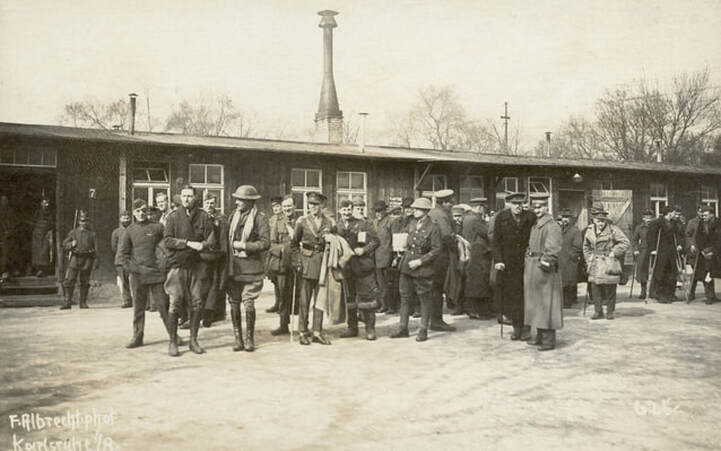The First World War
Charles Howard-Bury served with the 7th and 9th battalions of the British army's
King's Royal Rifles during the First World War, being promoted to the rank of Lieutenant Colonel.
He was mentioned regularly in dispatches and later awarded the Distinguished Service Order. He was captured
by the German army during its massive Spring Offensive of March 1918, remaining a prisoner for the remainder of the conflict.
King's Royal Rifles during the First World War, being promoted to the rank of Lieutenant Colonel.
He was mentioned regularly in dispatches and later awarded the Distinguished Service Order. He was captured
by the German army during its massive Spring Offensive of March 1918, remaining a prisoner for the remainder of the conflict.
|
'so many faces were missing'
|
|
At the beginning of the First World War, Howard-Bury returned to the British army. During the war he commanded the 7th and 9th battalions of the Kings Royal Rifles and saw active service at Arras, the Somme, Passchendaele and Ypres. He was mentioned in dispatches on at least six occasions and was awarded the Distinguished Service Order (DSO) in 1918, an award which was by that stage of the war reserved for distinguished conduct under enemy fire.
His battalion suffered terrible losses during the Somme, arriving in the area of Delville Wood during August 1916. They were engaged in heavy fighting and after one particular bloody day, Howard-Bury recalled: 'The return to camp was a very sad one, as so many faces were missing.' On 11 April 1917, he was ordered to lead his troops in an advance towards Wancourt, a French town near the Belgian border. It was an order that infuriated Howard-Bury who called it 'sheer murder'. He could see that a nearby high-point, 'Hill 90' was held by the Germans, who would have an unobstructed line of fire against the advancing British infantry. This hill, Howard-Bury protested to a general, must be taken before any infantry advance could proceed. The general concurred with Howard-Bury's analysis and passed his objections up the chain of command to the divisional staff. They insisted that they attack go ahead and Howard-Bury described the resulting scene in his diary: 'No one of the Divisional staff had reconnoitred the ground – their headquarters were ten miles away in Warlus, where they were quite safe. They wrote their orders there and refused to be guided by the views of the men on the spot. I had no time to write orders and so sent the original order to Williamson who was commanding the two front Companies. The bombardment was to start at 6-30 and they were to retire a couple of hundred yards behind their trenches, as the bombardment was starting on their line. In retiring through the wire they suffered many casualties. The order luckily did not reach two platoons, who remained in the trenches all the time and who did not suffer a casualty. The bombardment was an absolute farce, about one battery firing all over the place. Several of our shells landed quite close to where I was and killed some of our men. Whitley started from Bt H.Q. with a Company and a half and before he had gone 300 yards, we realized that the 56th Div had not taken Hill 90 in fact they had not left their trenches and our men were simply mown down by enfilade MG fire. As soon as I saw what was happening and that it was madness to go on any further, I telephoned to Brigade and got leave to withdraw those that I could. I managed to collect 146, but Whitley was alas killed. He knew it before he started and that he was going to his death and he was found the nearest up to the enemy, a nice gallant fellow that he was and best of officers.' |
At 3 o’ clock in the afternoon though it was raining slightly the gas was let out: it was a most uncanny sight to see the greyish yellow vapour pouring out of the pipes & flowing along the ground towards the German lines. It kept at first very low only about four feet deep, but as it spread further on it rose a little & formed a regular wall of fog about fifteen to twenty feet high. The fog took only about 30 seconds to reach the nearest German trenches so that they had not much warning. There was a little rifle fire at first, but this soon stopped & for about five minutes there was silence. Then the guns & trench mortars on both sides started & for an hour & a half there was a terrific bombardment. We were well scattered in small trenches everywhere & in spite of the tornado of flying missiles, we had very few casualties. Ferard was wounded but not badly & three men: another one became deaf & dumb & one or two suffered from shell shock. Two were gassed: on[e] of them a R.E. corporal who died very soon after.
Charles Howard-Bury, describes a gas attack on German trenches, 27 June 1916.
Trinity College Dublin has printed extracts from Howard-Bury's First World War diaries and memoir
at Irish soldier's voices from the Great War.
Allied officers in Karlsruhe prisoner of war camp, Germany, 1918.
Howard-Bury spent time in the camp after being captured by the German army in March 1918. (Photo: Australian War Memorial)
Howard-Bury spent time in the camp after being captured by the German army in March 1918. (Photo: Australian War Memorial)
|
Prisoner of War
|
|
Howard-Bury remained at the front throughout the war. In March 1918, his battalion was sent to an area south of Saint-Quentin, a town in northern France, where they faced the brunt of the German Spring Offensive. By March 1918 the German high command were desperate to break the deadlock on the Western Front before American troops could play a decisive role in the conflict. The Germans had already achieved victory on the Eastern Front in the aftermath of the 1917 October Revolution and the subsequent disintegration of the Russian army. As such, the German high command could concentrate its forces in the west. At 4.30 am on 21 March, the German army opened its offensive with a massive artillery barrage. This was followed by infantry attacks with the the Germans using specially trained shock troops to break through the lines. The Allies suffered huge losses and their communication networks were shredded, a state of affairs that was exacerbated by a heavy mist which clung to the ground at many points that morning.
As the mist dissipated, Howard-Bury realised that his battalion headquarters and its fifty remaining troops was completely surrounded. Around 11.00am he released a carrier pigeon to alert headquarters that the battalion would fight on but by 3.30pm that afternoon they were overwhelmed and forced to surrender. Charles Howard-Bury was now a prisoner of the German army, spending time in the prisoner-of-war camps at Karlsruhe, Furstenberg and Parchim. He was party to a number of escape attempts and later recalled one occasion in which the sentries were distracted by the sight of 'a little dwarf about 4ft high' (a local village tailor whom the prisoners had nicknamed Cuthbert) dancing on a piano. Howard-Bury cut the boundary wire, allowing two prisoners to escape, although they were recaptured soon after. In September 1918, he made his own escape attempt despite being seen, and fired at, by the sentries. Howard-Bury, who could speak German, remained free for over a week before being recaptured. In December 1918, a month after the war's end, he was released from captivity. Howard-Bury would use his newly-restored freedom to plan the greatest journey of his life - an expedition to Mount Everest. |
We were called at seven, then came the cooking of breakfast, which consisted of a cup and some biscuits fried in dripping, after which we shaved and dressed. On three days in the week there were hot shower baths, which were quite good, and cold shower baths on all the other days. The first roll call was at ten o'clock, after which we either learnt Italian or walked up and down under the chestnut trees; the next hour was spent in reading and translating the news out of the German papers. So-called lunch was at 12, but it took very few minutes and was usually followed by a walk up and down, from 2-3 a game of billiards, from 3-4 preparing and eating tea, which again only consisted of biscuits with occasionally a little jam. From 4-6 we had a regular four at Bridge consisting of General Dawson, Lord Farnham, Troughton and self. At six we started to prepare supper and this usually took us on to the last roll-call at 8:45 p.m. As it was too early to go to bed then, we walked up and down for another hour under the chestnut trees. No one was ever allowed outside the camp under any pretext, so that the inside of the barbed wire became the whole world to us.
Charles Howard-Bury discusses life as a prisoner of war in a camp near Karlsruhe. The excerpt is from a document titled 'Some experiences as a Prisoner of War in Germany' and is dated 1 March 1919.
Trinity College Dublin has printed extracts from Howard-Bury's First World War diaries and memoir
at Irish soldier's voices from the Great War.


